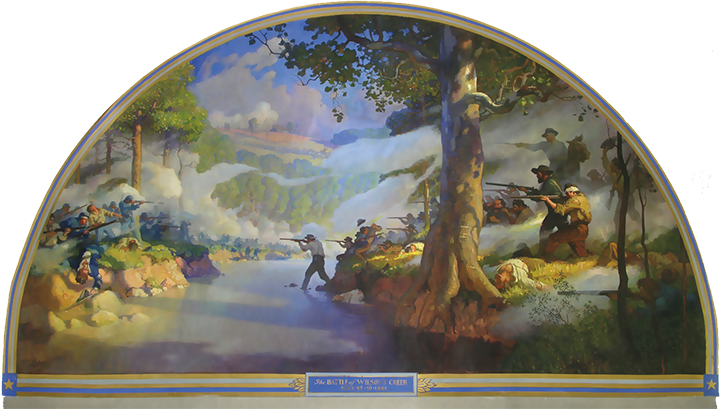The Battle of Wilson’s Creek
Former Lieutenant-Colonel Alfred Moore Waddell of Wilmington, North Carolina was a prewar Whig, newspaper editor and opposed to the secession of his State. On July 26, 1865 he addressed a colored audience at the Wilmington Theater, advising them on their newly-conferred liberty and subsequent duties and responsibilities — and that the white people of the South they grew up with were not their enemies, despite what the carpetbag element was telling them. At the time he made the address, the black soldiers occupying were a lawless element who were arming local blacks and inciting them to insurrection.
Bernhard Thuersam, www.Circa1865.com The Great American Political Divide
Lincoln’s Sable Arm in North Carolina
“[Alfred Moore Waddell of Wilmington wrote Reconstruction Governor W.W. Holden that] The town had a Negro garrison, and with its large Negro population was in a state of great alarm. [He] wrote the governor in early June [1866] that outrages by the troops were of daily occurrence and that the effect of the presence of the colored troops on the Negro population was very dangerous. Arrests [by colored troops] were constantly made without any cause, and in one instance the soldiers were instructed, if the person arrested said or did anything, to run him through [with the bayonet]. There was little or no redress, as unusual latitude was given the colored troops.
In July the mayor and commissioners wrote describing the conduct of the Negroes and the apprehension felt by the white people of an insurrection. The Negroes had demanded that they should have some of the city offices and had made threats when they were refused. The governor replied that the citizens had acted rightly in refusing to appoint Negroes to office, as the right to hold office depended on the right of suffrage. He also assured them that if the Negroes attempted by force to gain control of public affairs or avenge grievances suffered at the hands of the whites, they would be visited by swift punishment; but if obedient to the laws, they would be protected.
[In] Beaufort, a party [of colored soldiers] from Fort Macon committed a brutal rape and were also guilty of attempting the same crime a second time. They were arrested in the town and the garrison of Fort Macon threatened to turn its guns upon the town if they were not surrendered. The condition of affairs there was so bad that General [Thomas] Ruger forbade any soldier to leave the fort except under a white officer.
Near Wilmington, Thomas Pickett was murdered and his two daughters seriously wounded by three soldiers from the Negro garrison at Fort Fisher in company of a Negro from Wilmington. In Kinston, a citizen was beaten by the soldiers, and upon Governor Holden’s complaint to General Ruger, the garrison was removed. Soon afterwards the governor notified General Ruger that a [railroad] car of muskets and ammunition had been side-tracked at Auburn, and while left unguarded had been opened by the freedmen and its contents distributed. The possessors of the arms then became the terror of the community.
Complaints of colored troops were also sent in from New Bern, Windsor, and other eastern towns. In September 1866, the last remaining regiment of Negro [troops] was mustered out, and that cause of discontent disappeared. The white [Northern] troops as a general thing, after the confusion incident to the surrender was over, behaved well. In Asheville, however, they were so disorderly and undisciplined that great efforts were made by the citizens to have them withdrawn.”
(Reconstruction in North Carolina, Joseph D.R. Hamilton, Books for Libraries Press, 1914/1971, pp. 159-161)




